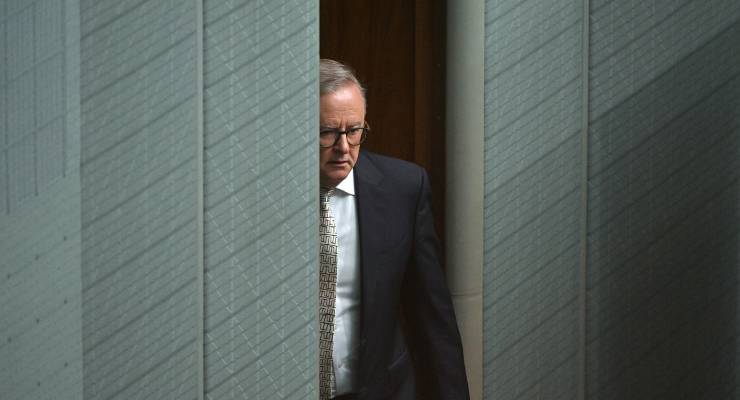
In February, following the publication of the personal details of members of a WhatsApp group of almost 600 Jewish creatives, journalists and academics, the prime minister signalled changes to doxxing laws in a strongly worded interview with 2GB’s Chris O’Keefe.
Prime Minister Anthony Albanese called the publication of the members’ details “completely unacceptable”, and said he had asked the attorney-general to bring forward legislation in response to an existing review of the Privacy Act. Attorney-General Mark Dreyfus said the changes would be brought forward “as soon as possible”.
The government’s rushed response was criticised in some quarters, with academics and lawyers saying that current legislation can already apply to doxxing — using a carriage service to menace, harass or offend is already an offence under Commonwealth and equivalent state legislation around the country.
New documents obtained by Crikey reveal that government agencies were taken by surprise by the prime minister’s decision, and that he decided to move forward on the legislation without new advice.
A freedom of information request was made by Crikey to the Office of the eSafety Commissioner, requesting advice given to the commissioner on changes to doxxing laws after the Nine papers’ story on the WhatsApp leak, as well as relevant inter-agency communications including the Department of Prime Minister and Cabinet, Attorney-General’s Department, Department of Communications and the Arts and the Prime Minister’s Office, on top of any relevant legal advice.
The Office of the eSafety Commissioner found two documents within the scope of Crikey’s request, and released both under freedom of information laws.
The first was a February 13 email from Morag Bond, the executive manager of industry regulation and legal services at the Office of the eSafety Commissioner, to Toby Dagg, the general manager of the regulatory operations group, as well as other staff, marked as “high importance”.
Bond asked whether the Office of the eSafety Commissioner had been contacted at all “regarding the doxxing announcements this morning”.
“I got the impression that the announcement may have caught the department by surprise,” Bond wrote.
The other is an email on February 18 from Dagg to several senior officials including Bond and the Commissioner herself, Julie Inman Grant.
In that second email, Dagg mentioned that the Attorney-General’s Department was planning to put in place a public consultation on the changes to the Privacy Act. Dagg noted the office faces “challenges … in relation to doxxing in its simple form, where there is no accompanying intent discernible to cause serious harm or where we can’t make out that material incites, instructs or promotes crime and violence”.
Crikey asked Victoria Police whether any charges had been laid concerning the leaked WhatsApp group. After two days, Victoria Police replied simply: “The investigation remains ongoing.” When pressed, a spokesperson for Victoria Police told Crikey: “If the investigation’s ongoing, there hasn’t been any charges laid.”
The pro-Palestine activists responsible for publishing the information of the WhatsApp group members made a statement on social media on February 11, saying that the decision provided “critical insight into how Zionists operate in so-called progressive arts, academic and media spaces”.
The activists disputed a number of claims made in media reporting, such as in The Age, and said that the WhatsApp chat was leaked by a member of the chat, described by them as a whistleblower.
“There were no addresses shared. There were no phone numbers shared. There were no emails shared. These were deliberately redacted. There were no private photographs, and certainly no photographs of children shared,” they said.
While the review of the Privacy Act, which began under the Morrison government, didn’t reference the word “doxxing”, it did cover the concept of “de-identification”. The Albanese government agreed with the majority of the reforms proposed by the review, including a consultation on introducing a criminal offence for “malicious re-identification of de-identified information where there is an intention to harm another or obtain an illegitimate benefit”.
That consultation was announced on March 10 this year, opened on March 11, and will run until March 28.
A second freedom of information request was made by Crikey to the Department of Prime Minister and Cabinet, in similar terms to the first — that is, requesting advice provided to the prime minister about proposed changes to doxxing laws. The request also sought legal advice received by the prime minister relating to the definition of “doxxing”, or what language may be used in an amended Privacy Act to define acts described as “doxxing” by the prime minister in his interview with 2GB.
Crikey’s request for access to these documents was refused on the basis that the documents didn’t exist.
The Office of the eSafety Commissioner defines doxxing as “the intentional online exposure of an individual’s identity, private information or personal details without their consent”, and says that it can refer to several different practices including:
- Deanonymising doxxing — revealing the identity of someone who was previously anonymous
- Targeting doxxing — revealing specific information about someone that allows them to be contacted or located
- Delegitimising doxxing — revealing sensitive or intimate information about someone that can damage their credibility or reputation
“The government had already committed to stronger privacy protections for Australians in its response to the landmark review of the Privacy Act,” a government spokesperson told Crikey.
“The government is now bringing forward that legislation, and in addition to the proposals in the review, will be including additional measures to protect Australians from doxxing.”








Add this to the long list of ‘captain’s picks’ by various Prime Ministers, which all go to prove none of them should be allowed out without adult supervision.
Let us take the race/ religion out of this situation and contemplate it.
A group of like minded people get together via social media in a private chat room and proceed to express their “concerns and outrage” about a war, possible war crimes committed on both sides and a humanitarian disaster looming caused by one side of the war.
Pretending to be outraged individuals, without a stated agenda.
They then bombard the management board of a media outlet, which has a charter from the Australian people to give a fair and unbiased media coverage of all aspects of a situation.
Pretending to be spontaneously protesting individuals, rather than an organized group abusing the complaints department.
Oh, golly someone “outs them” as an online protest group and this articulate and organized protest group then demands protection from the very people they were whinging to a moment ago. That is the media!
Sorry, you can’t have it both ways, show your faces and put names to the complaints or shut up, as everyone else is meant to do.
That’s the part that bugs me about this “some of our best donors are fanatically pro-Israel” emergency legislation. A group of people, who wished to remain anonymous, organised to wreck the careers and livelihoods of people with whom they disagreed. And when someone discloses their names they cry out that they’re the victims here.
Now, I would agree that tracking down names could be a bastardly act if they were comparatively vulnerable because the people they were attacking were powerful and if those powerful people had actually done something criminal (rather than their actual “crime” of stating their opinions). But the people on the list were not blowing any whistles, just victimising other people. And while they didn’t want their names known they were quite happy to use their status (e..g. as lawyers) to pile on the pressure.
Of course it was rushed. They didn’t even stop to learn what doxxing is.
It’s disgusting that this was the government’s reaction to that group conspiring to get people fired for exercising the one implied right the constitution gives us.
This will also, of course, stop people passing around lists of businesses/ people to boycott.
Heh. Deleted scene from Shazam!:
“Say my name!”
“I can’t. That would be doxxing.”
“What? No it wouldn’t!”
I’m gobsmacked that all the attention seems to be on the revealing of identities of people in this group, and no attention or comment on what they were doing, which was conspiring to go after people whose views they didn’t like, by contacting their employers and presumably harming their employment.
This is a pretty disgusting thing to be planning, and surely there’s laws against conspiring in this way?
Indeed . A certain Australian writer is frequently criticised for doxxing the men that send her threats of sexual violence and murder… honestly, that people think they can make such threats is a big part of the problem.
The problem is there is no ‘right to privacy’ in Australia.
The only OECD country without a bill of rights..just ‘implied’ (limited) rights..obtained through an international treaty.
to get those ‘rights’ enforced the courts are necessary ..
btw your image is not copyrighted..anyone can use it.
many of the social media are scraped every day for images, taken ‘without permission’
Permission is not necessary to take an image, the photographer holds copyright not the subject.
Anything able to be seen from a public place is ‘fair go’ ..with advanced lenses that means most activities are observable and no longer ‘private’..
Australia has a long way to go.
Anything put online , can be considered to be given away and in the public domain..
Doxxing? Essentially unenforceable..there are ways around ‘using a carriage service’ laws..printed as posters and placed strategically around the place will mean others will take photos and circulate .. many of the overseas based social media do not ‘take down’ so any doxxing laws are futile.
Anything able to be seen from a public place is by definition not private!
Privacy laws in Europe especially in the UK are mostly used by the wealthy to shut down scrutiny.
Does Australia, the defamation capital of the world, really need to give the wealthy another tool?
Just so you can claim privacy over something you shared publicly?
While technically true there are definitions of “public place” that the average punter would probably not consider reasonable. Eg: a drone hovering over your pool or outside your bedroom window.
I should probably add that there are laws on the books to protect people from photography, etc, when they have a reasonable expectation of privacy, but that’s about recording specific acts and places. So if someone’s hovering a drone over your pool (or just standing on the balcony next door) taking photos while your kids are in there playing, you’re only going to have legal recourse if they’re naked.
Europe or more specifically the EU is protected by the EU GDPR, Digital Services Act and anti-SLAPP directives, which I think have been replicated by the UK.
Australia, suboptimal or nothing, as the same would constrain the powers that be, including our RW MSM cartel and related.
The purpose of Copyright is to protect the rights of creators of creative works. The photographer owns the copyright (unless they’ve licensed it to someone else) because the photographer created the photo.
Copyright is an entirely arbitrary construct and concept, and should absolutely not be shoehorned in any way into an attempt at protecting people’s privacy.
This is not true. Indeed, the opposite is true. Everything is automatically protected by copyright unless excluded or licensed (eg: as you do in the fine print whenever you upload something to Facebook).
I’m all for protecting people from any kind of online nastiness, especially if it puts someone in danger, but somehow I doubt the government would’ve moved a finger if supporters of the blue team ‘doxxed’ Palestine supporters.
Indeed, when Osman Faruqi was doxxed they didn’t lift a finger.